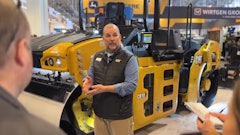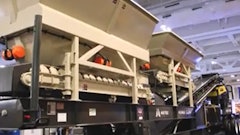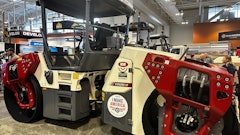
Recognizing, confronting and adapting to market limitations can determine a contractor’s success or failure, but few contractors are willing to risk a complete transformation like the one Prestige Striping Services underwent in 2014.
But their drastic overhaul worked and today they go to market as Prestige Paving Co., Corona, CA, a successful full-service paving and pavement maintenance company serving Southern California.
But the route to becoming a successful pavement maintenance contractor was unlike just about any route taken by any other company. Started in 1997 as a mom-and-pop shop by Sabas Trujillo, Prestige Striping Services did well for years, according to Anthony Trujillo, general manager of Prestige Paving and son of founder Sabas. The striping contractor was doing so well they were regularly being asked by customers to do paving, sealcoating and repair work – but the contractor referred those requests to the companies that hired Prestige to stripe.
In 2000 Sabas Trujillo started a separate company, United Paving Co., Corona, with a partner who had a background in paving and provided financial support. United Paving has since grown to become one of Pavement’s Top 75 Paving Contractors in 2015.
While United Paving was growing, Prestige Striping had become what Trujillo says was the “go to” striping contractor for the area’s general contractors and paving contractors. But Trujillo saw that future growth as a striping contractor was limited. He says the area Prestige Striping worked in had about 50 paving contractors from whom Prestige Striping obtained work. But he realized growing the company would be restricted by that number of potential customers.
“We were doing a lot of work, no question about that, but as a striping company we were restricted to 50 paving companies and that didn’t give us much room to grow,” Trujillo says.
To compound the growth concerns, the area’s paving and general contractors knew that Prestige Striping was owned by the same person who owned United Paving – a competitor – so many paving companies and GCs wouldn’t hire Prestige Striping anymore.
“The industry knew Prestige Striping was owned by the same person as United Paving so in many cases they wouldn’t give us the business,” Trujillo says. “We either had to go under or change our approach.”
A Quick Transformation
So in 2014 Prestige Striping transitioned – almost overnight – into a paving and pavement maintenance company: Prestige Paving Co., and they now have new and different clientele: Property managers and property owners instead of paving contractors.
And those paving contractors that had been customers of Prestige Striping? Well, they’re now competitors of Prestige Paving… sort of.
Trujillo says that when the company was Prestige Striping, striping was the only work they did. “Customers who were satisfied with the work and relationship often asked ‘What other work do you do?’ But we never took on other work because we had very good relationships with our paving customers and we didn’t want to damage that,” Trujillo says. “So when a property manager asked us to do more work or if we saw that a property needed patching or other maintenance we would let our paving contractor customer know that. We referred the work to them.”
When Prestige Striping became Prestige Paving they made one very unusual decision: They decided they weren’t going to pursue the properties they had striped as a subcontractor for the area’s paving firms.
“We actively avoid customers of people who had given us striping work. We just don’t want to step on anybody’s toes,” Trujillo says. “Those are people who helped us and gave us work and treated us with respect when we striped for them and we want to treat them with respect. There’s so much work out there I don’t see the need to tarnish our integrity by going after our customers’ customers.”
Prestige Paving Co. is now a full-service paving & pavement maintenance company that focuses on parking lots from new construction to rehab and maintenance. Trujillo says the company generates 65% of sales from paving, 25% from sealcoating and slurry seal, and 10% from striping. He says 12 crews are made up of 50 workers and 10 people staff the office including sales. Prestige Paving works primarily in central and Southern California but also regularly works outside its region for customers that have multiple properties throughout the state.
“Our potential now is great,” Trujillo says. “Our foundation is set and there’s so much room to grow if we have the right team and if we push hard and work hard.”
Staffing from Striping to Paving
Trujillo says getting work for the new Prestige Paving wasn’t difficult because the Prestige name was a positive brand that people knew and respected. “What was difficult was finding the talent and recreating the type of team that was so successful striping for us. It was most difficult to develop the team that would have to execute the sealcoating and paving work for us.”
It took time to find and develop the Prestige Paving team, which Trujillo says made 2014 a difficult year with a tough learning curve. “But by the time 2015 came around we’d gotten it together,” he says.
Trujillo says that as they planned the switch from a striping contractor to a paving and pavement maintenance contractor they realized they’d need people with entirely different skill sets, and they pursued key people first. “At the beginning we recruited talent. We knew we needed crew foremen and machine operators and we wanted to hire people for those jobs who had experience because we didn’t have time to train them,” Trujillo says. “Once we got those people on the team we looked to hire guys we can train who will fit into our system.”
He says they advertised aggressively in the newspaper and on Craigslist and also relied on referrals from employees. He says about half the people who applied for a position at Prestige Paving were turned away.
“They just weren’t a good fit for us and for the system we’re trying to develop,” he says. “We want to develop a reputable, team-oriented approach where people show up on time and look presentable and can interact with the customer and the public. Those are the people we’re looking for.”
So it took longer than he’d thought to fill all the critical positions within the new company such as paver operator, foremen and scheduling. And sometimes they made hiring mistakes just like most contractors do. “If a guy says he can pitch and talks like he can pitch but he gets out on the mound and acts like he’s never seen a baseball, that’s a problem,” Trujillo says.
Trujillo says the first year Prestige Paving spent too much time going back to jobsites to fix problems on jobs. “That not only doesn’t look good but it costs money and it means there’s other work we can’t be doing because we’re fixing jobs that already should have been completed,” he says. “But that was all part of the learning curve and by 2015 we’d had that all figured out.”
He says 60% of the employees hired that first year returned for 2015 and are still with the company. “So it wasn’t as bad as we’d feared, but we did work at making sure we had the right people for what we wanted to do,” he says.
“When we leave a project we want our employees to be able to pat themselves on the back. We them want to feel good about the job,” he says. “We want to hire people who want to feel that way about the work they do.”
Leading By Example
Trujillo says he thinks the best way of getting employees on board with any company’s system is simply to lead by example. “We’re out there with them all the time,” he says. “They see us around and they know that if they’re working hard we are working hard also. And there’s not much we expect them to do that we don’t do ourselves. If they have to be here at five in the morning then we are here at five in the morning.”
But he admits leading by example doesn’t always work, in which case management has a conversation with the employee. “If a guy doesn’t show up or comes in late, we obviously let him know that’s not acceptable but we explain it in terms of what that means to the team and to the company, not just that he didn’t do what he was supposed to do,” Trujillo says. “We make sure he understands how it affects the team. He needs to realize that if there are five people on a crew and he’s late that the other four people’s time is being wasted too. And the job is going to get started late, which makes us look bad in the eyes of the customer and it could mean we’re late starting another job.”
He says the company does hold regular meetings where the team approach and the emphasis on the company is discussed. “But at meetings, to tell you the truth, a lot of it goes in one ear and out the other. It’s real important to deal with it when the problem arises,” he says. “We’ve found it’s much more effective to catch it quickly and explain at the moment not only that it shouldn’t happen but what should happen instead.”
He says this approach did (and does) cost Prestige Paving some employees. “A lot of guys left, yes. Not everyone bought into it,” he says. “But that’s just the way it’s going to be. Maybe it’s not the right fit for you but if you’re going to be here it’s going to be this way.
“There’s definitely a sense of brotherhood and we reinforce that,” he says. “We emphasize that at the end of the day everything will be okay if we just take care of each other. If we can do that then the work and the company will take care of itself.”
[possible captions]
While United Paving Co. was “growing into a monster,” Trujillo says it was creating a problem for Prestige Striping. That’s because other paving companies knew the striping company and the paving company were owned by the same person – and competitors didn’t want to give work – striping or other paving work – to their competition. “They just wouldn’t use Prestige Striping and that was further hurting our potential to grow. It got to the point where we had to change or go under.”
“We do well because we all work very hard top to bottom,” Trujillo says. “Because we all work that way I’m not afraid to call out someone who’s not carrying his weight or working the way we expect.”

























